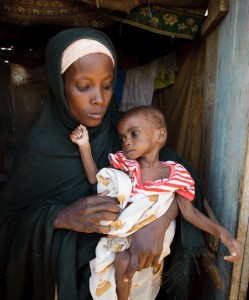Extreme poverty sets in motion a chain of cause and effect that ends in hopelessness. It is important to note that the hopelessness that is the defining characteristic of extreme poverty is not a character flaw in the poor. On the contrary, it is the dehumanizing end result of this chain of cause and effect.
The chain looks like this: It begins with chronic, severe deprivation. Malnutrition in children frequently results in developmental disability and even permanent cognitive impairment. Hunger in adults saps physical, emotional, and mental energy – imagine going without any food for several days at a time, the effect it would have on your abilities. Lack of safe water spreads illness and disease among the young and old alike. Efforts to secure drinking water and a bit of food most likely consume the lion’s share of the day. Little, if any, time and energy is left for education, income-producing work, and community improvement. This lack of freedom to make meaningful choices is what it means to be “trapped” in extreme poverty.
It’s not that the desperately poor haven’t tried to improve their lot… rather, it’s that they have no real choice. The desperately poor have learned from long, hard experience that no matter what they do, no matter how hard they try, they can not improve their situation. In a very real sense, there is a near total disconnect between efforts and results; they simply cannot have an impact on their circumstance. The end result of this life experience is hopelessness. Simply put, the desperately poor have no meaningful options for improving their situation. Can you imagine the burden of living without hope?
 When we are deprived of all hope, we are effectively robbed of our humanity; our living becomes a sort of deadened, going-through-the-motions necessary to survive for another day.
When we are deprived of all hope, we are effectively robbed of our humanity; our living becomes a sort of deadened, going-through-the-motions necessary to survive for another day.
Hopelessness is not a deficiency in character on the part of the desperately poor; rather, it is the nature and cruel result of being trapped by circumstances upon which they can have no impact.
For many who live in extreme poverty, the word “trapped” describes their day to day existence. The effects of severe, daily deprivation serve to make improvement in their lives all but impossible — the desperately poor are in a frighteningly real sense prisoners of their circumstance. The biblical word is oppressed – not by an evil dictator or landowner, but by a systemic failure in our world – the result of our collectively fallen nature. The biblical word for this systemic failure is injustice. And as Eugene Peterson, author of
“The Message” points out, “Justice is a serious gospel-prophetic mandate.”
What does God expect of us? His Word is clear… for more on the biblical mandate for helping the poor, read Answering the Call.
If you found this post meaningful, please share it with a friend!